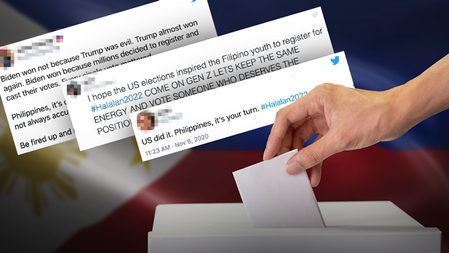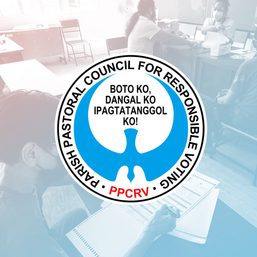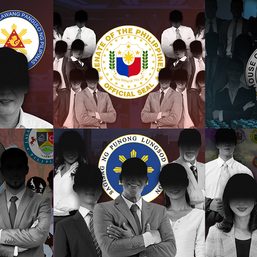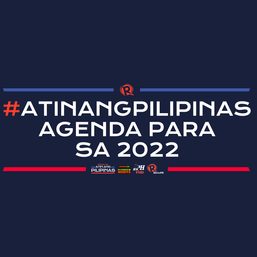SUMMARY
This is AI generated summarization, which may have errors. For context, always refer to the full article.
![[OPINION] Lessons Filipinos can learn from the 2020 US elections](https://www.rappler.com/tachyon/2020/11/imho-lessons-from-us-elections.jpg)
The United States presidential election may be the single most important poll in the world, as it influences economic, political, social, and environmental actions on the global level. Joe Biden is poised to become its next leader, yet current President Donald Trump’s unwillingness to graciously concede could create a tumultuous succeeding days or weeks for the country.
Many comparisons have been drawn between Trump and Philippine President Rodrigo Duterte, which is why it is interesting to examine the implications that the 2020 US elections have on the Philippines’s current and future political environment.
Firstly, it is time netizens realize that online sentiments may not be as fully representative of the sentiments of Filipinos as they think. The technological divide has been highlighted during the COVID-19 pandemic, as poorer sectors struggle to access online platforms for their education or employment. Netizens must understand that the issues with which they are concerned the most may not be the same as what those with less online access prioritize.
While netizens focus more on “big picture” issues such as human rights, environmental protection, and reducing inequalities, all of which have relatable implications on a personal level, poorer sectors are more concerned about their day-to-day affairs. They worry about what to put on their tables for their families, the safety of their communities, and how to earn income for their expenses.
These people have been neglected by the system for so long that they throw their support behind anyone who promises them these benefits, even on a momentary basis. They are willing to overlook the poor character, questionable decision-making, and even false information coming from their chosen leaders as long as the status quo is being shattered and their concerns are finally addressed. Can you really blame them for making their choice?
This exploitation of the fears of citizens helps explain why Duterte has remained popular, as indicated in recent surveys, and why Trump still garnered nearly 50% of the popular votes against many expectations. Controversies have been associated with both administrations on an almost-daily basis, with criticism of their respective leadership becoming more vocal with every person either the President or their allies attack. Yet millions of people still support them and view them as genuine alternatives.
The truth is these leaders are not true alternatives or outsiders to the system; they have always been part of the system. They grew their power and influence through avenues outside of the spotlight afforded to the turbulent environment of national governance; this has allowed them to portray themselves as independent of the scandals and failures associated with the ruling leadership.
The 2020 United States elections have ironically exposed the deep divide on many levels that has persisted throughout its history. Yet division has arguably been present for the entire existence of many democratic countries. A strong nation views division as diversity and unites its people with respect to it.
What allows democracy to thrive are the presence of an educated citizenry that actively engages in political processes, the checks and balances that prevent consolidation of power, and independent entities that keep the public educated and monitor the balance of power and implementation of laws and policies. For any nation to thrive, its citizens must believe that the systems and processes in place are aligned with the values and beliefs they perceive to be representative of their land and its people. When there is lack of respect or outright disregard for these systems and processes, the country’s development, stability, and identity could be compromised.
This is why Trump’s tactics of false claims of victory, baseless accusations of fraud, and flawed legal challenges about the election results should be looked at as a warning for our country. Spreading misinformation, aided by blindly loyal supporters, only causes more fear and political instability that further deepens the national divide and ultimately benefits no one. This is a scenario that could realistically occur in the Philippines during the 2022 elections, and we must be ready to avoid that possibility from unfolding.
One of the key aspects is the presence of independent media, a vital part of any democracy. Several US media outlets opted to cut off Trump’s recent press conference, filled with false claims about the ongoing election. This is a lesson from which Philippine media can learn, during an era where threats of being censored and shut down are prevalent.
Another important step is strengthening voters’ education, not just to ensure that more eligible Filipinos will exercise their right to vote, but to also bridge the disconnect and division that have hindered the country for decades. The narrow margins in the US election show that every vote truly counts, with the relatively higher turnout among youth voters playing a key role in deciding the outcome.
It will take more than just one election period to initiate these and other cultural and attitudinal changes, but they would help the Philippines avoid instances of nearly electing convicted plunderers, sons of plunderers, and the like to top elected government positions. It is safe to say that Philippine democratic institutions and processes are not as mature as in the US, but when will there be a better time for our systems to take the proverbial next step than now?
When the time comes for Filipinos to vote, ask yourself this: is a charismatic, authentic, willful leader with poor character and lackluster decision-making capability really any better than the traditional politician we have been accustomed to? Is attacking the same democratic institutions and systems that represent the character of a nation, the same entities that he used to achieve political power to begin with, really the true mark of a good leader?
For both questions, the obvious answer is no. We deserve better. And we need better. But first, we must stop fearing fear itself and vote wisely in 2022. – Rappler.com
John Leo is the Program Manager of Living Laudato Si’ Philippines and Climate Action for Sustainability Initiative (KASALI). He has been a citizen journalist and op-ed writer since 2016.
Add a comment
How does this make you feel?





![[PODCAST] Beyond the Stories: Ang milyon-milyong kontrata ng F2 Logistics mula sa Comelec](https://www.rappler.com/tachyon/2021/11/newsbreak-beyond-the-stories-square-with-topic-comelec.jpg?resize=257%2C257&crop_strategy=attention)
There are no comments yet. Add your comment to start the conversation.